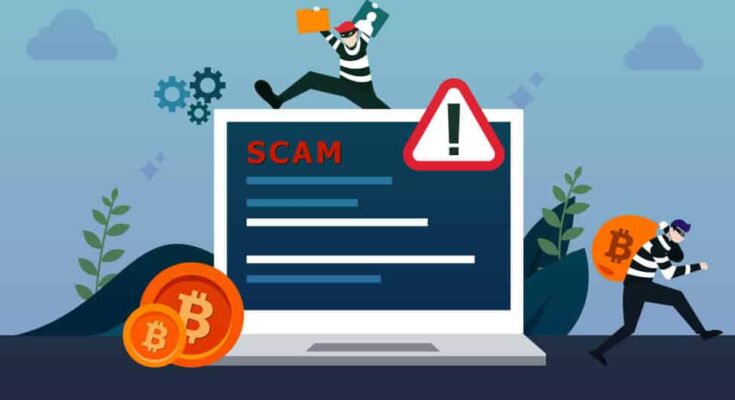A digital wallet can be used to hold digital currency, which its owner can then convert into cash by transmitting it to a bank account. Digital money is not the same as cryptocurrency, like bitcoin. However, it is more difficult to recoup from theft because it runs independently of banking institutions and uses blockchain for verification.
Although bitcoin is a more recent fad, thieves continue to steal similarly. Therefore, the following list of common bitcoin scams should be avoided.
Common Bitcoin Scams to Avoid
These are the Bitcoin scams to watch out for and steer clear of.
Fake Cryptocurrency Exchanges:
How could one attract eager cryptocurrency investors who want to get in on the action? First, even if it’s fake, assemble a cryptocurrency marketplace.
There are indeed fake cryptocurrency exchanges; on occasion, they have been utilized to rob lenders of their money.
By promising them free bitcoin, scammers may find it simple to persuade crypto investors to join up for the transfer. However, after sending the first payment, victims realized nothing was true and that bitcoin scams had conned them out of their money.
What can be done to prevent these phony exchanges? First, start by sticking to well-known, reputable cryptocurrency exchanges. Before opening an account with a new or unfamiliar deal, consider it and make sure it’s legal before moving on. To learn more about an exchange’s credentials and reputation, consult relevant websites, newsletters, forums, and other reliable information sources. Additionally, it never hurts to remember the adage that our parents and grandparents instilled in us at an early age: If something seems too good to be true, it probably is.
ICO and Fake Cryptos:
If you have ever invested in an IPO, you should be familiar with ICOs (IPO). Initial public offers, IPOs, and initial coin offerings (ICOs) are similar. When a brand-new cryptocurrency or coin makes its market debut, an ICO is launched.
That will garner some attention. But regrettably, con artists also hold this to be true. Because of this, ICOs—or ICOs that advertise fake cryptos—are vulnerable to fraud.
An ICO scam might operate as follows: Scammers tease investors with a false ICO by urging them to pay upfront. The ICO never happens, and investors never recover lost bitcoin after exchanging money.
Scams of this nature are frequent. (SEC) has established a website that resembles them in response to the notification. However, when you try to invest, it directs you to educational resources rather than stealing your money.
Before investing in a cryptocurrency initial coin offering (ICO), completing your homework is a good idea.
Social Engineering Scams:
These cover scams on social networking platforms, phishing attempts, hacking, and more.
For instance, a phishing attempt to trick users into exposing their credentials can take the appearance of an email asking cryptocurrency investors to update their passwords or personal information on a crypto exchange. Potentially, a fraudster could obtain access to an investor’s assets and sell them with that information.
Always verify the sender address on emails like this; if it’s filled with errors or uses an unusual font, it’s probably a phony email. If feasible, compare it with earlier emails from the exchange that you are confident are authentic. Go directly to your crypto exchange rather than on any email’s links. Then, you can check if your password or personal email needs to be updated there.
It’s crucial to use caution on social media as well. For example, you can receive messages from phony social media accounts asking for investments or deposits to take your money and run. A useful generalization? Trust your instincts rather than social media profiles because it’s too simple for bots or other people to fabricate real accounts.
Ponzi Schemes:
The Ponzi and pyramid schemes are very similar. In essence, it’s a hot potato game where younger investor’s place bets, and older ones pay them off. It’s a well-known financial ploy that has permeated the bitcoin industry.
Authorities have cracked down on cryptocurrency Ponzi schemes, particularly those that use bitcoin to lure in new investors. Government regulators claim to find and prosecute many Ponzi scheme cases each year, including those involving cryptocurrencies.
The assurance that you will invest your funds with no danger to you using the security of significant gains is one typical warning flag indicating a Ponzi scheme (or virtually any fraud). But unfortunately, since there is always a risk involved in investing, there is never a guarantee of returns.
Pump-and-Dump Bitcoin Scams:
Especially in light of the Games top scandal from early 2021, the “pump-and-dump” scheme is well-known among stock market players.
A pump-and-dump involves several traders or investors buying a product, such as a penny stock, and then selling (or dumping) it at a higher price. Investors who joined during the first run-up ended up in the negative.
Naturally, they use cryptocurrency for the same play. According to government regulators, pump-and-dump bitcoin scams can be wildly successful in cryptocurrency. As a result, they advise investors to conduct due diligence before making any investment decisions.
Conclusion:
The cryptocurrency world might be dangerous if you don’t know what to look out for. Investing in cryptocurrency is comparable to investing in other assets in that regard. There will always be Bitcoin scammers, fraudsters, and con artists looking for a means to get their hands on riches or value of any type.
However, a few precautions will better equip people to secure their property. A reliable rule of thumb is that if something sounds too good to be true, it probably is. It includes studying a company before investing in it.




